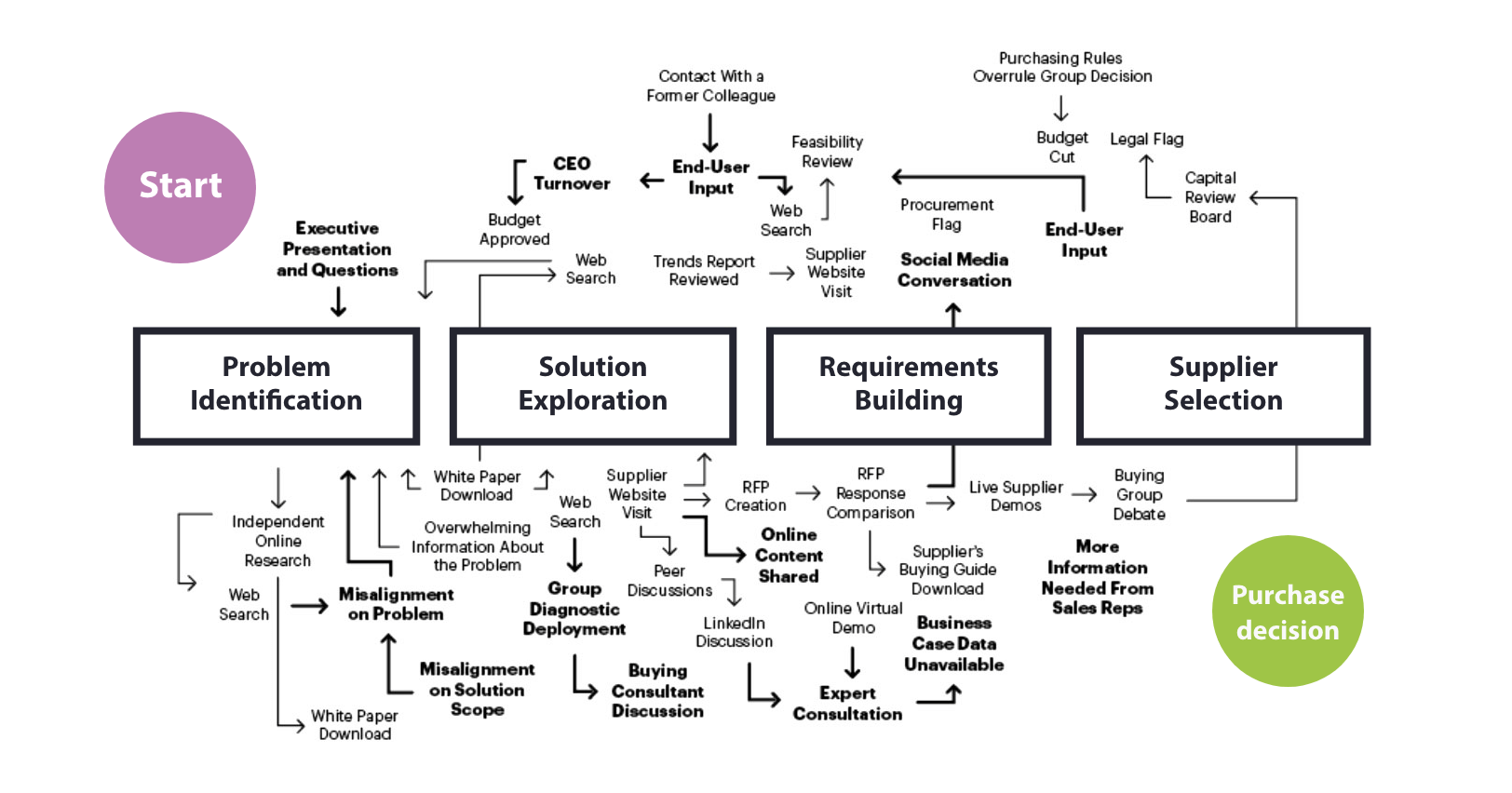The need to keep sales increasing is a constant struggle in the manufacturing world. Contract manufacturers need to invest in the facilities and equipment that can keep custom rolling in. But who’s filling the pipeline to justify that investment and support that growth?
Sales teams once led the conversation with prospects. They hit the phones, rooted out leads, nurtured them, and closed the deal when it was right. But the internet changed all that.
Now, prospects are dictating how and when they buy. Each organisation has more buyers with skin in the game than ever before.
B2B buying is now a team game - and so is selling
Think about the typical B2B manufacturer buyers’ journey and how it’s changed in the last ten years - think about the growing complexity of requirements and the number of individuals involved.
The OEM's journey to agree on pain points, identify solutions and assemble a shortlist of suppliers is a maze of digital journeys that coincide, overlap and fold in on themselves.

Teams of prospects, often with different agendas, are researching potential solutions simultaneously. They’re scrolling socials, prowling websites, listening to industry podcasts, reading business reviews and expert blogs.
But hardly any of this involves talking to your sales reps - at least not to start with.
Here are some figures that should give every B2B manufacturer pause for thought
- Most B2B customers have completed 57% of their buying tasks before engaging with a rep
Source: Gartner - 80% of Interactions Between B2B suppliers and buyers will occur in digital channels by 2025
Source: Gartner - 69% of B2B buyers prefer online research for information gathering than talking to sales reps
It’s a profound change from a world where salesmen (and they WERE mainly men) once were the gatekeepers of information and steered deals singlehandedly to close.
But luckily, this new sales landscape is a challenge modern marketers are uniquely equipped to address. Your sales reps can’t be there to answer queries, overcome objections and steer prospects’ thinking 24/7.
But your brand and your content can.
To achieve this, your marketing and sales teams can work together to accelerate the sales cycle, with marketing as the engine for sustainable demand and lead generation.
1. Marketing makes early connections between sellers and buyers
In the age of inbound and social marketing, brands can speak to and interact with future prospects way before they actively start looking for a new supplier. Sometimes, even before they know they need your help at all.
Through the right content, marketing can bring right-fit prospects organically into your orbit, rather than sales teams corralling them by force into your sales funnel.
Marketers can build SEO strategies that target intentional searches around familiar pain points for their audience and aid early discovery.
They can start seeding relevant content on social media so your brand is in buyers' intelligence mix from the outset.
Using social media, you can share takes on topical issues, contribute to industry forums, and add to discussions to help build an audience for your company. You can craft blogs and articles that speak to buyer’s interests and concerns, sharing your expertise to illuminate their problems in novel and exciting ways. Over time, you can capture email and social follows - with offers to deliver more relevant (and brilliant) content in the future.
Through this activity, your marketing team can build an audience primed to listen to your voice and solutions. An audience who recognises you as an authority in your sector, a brand that they can trust.
This process of demand generation is the foundational rock of modern sales and marketing strategies:
"When marketers talk about the “customer’s journey,” they realise there is a step before customers enter their sphere of influence. Marketers must design the experience that creates the desire for customers to take that journey in the first place."
Robert Rose - CMI Demand Generation Report
2. Marketing addresses the way buyers want to buy now
As your prospects continue to navigate the buyers’ maze - it’s the marketers’ job to make your company an integral part of their decision-making mix.
Their role is to seed your website and digital channels with collateral that will support buyers as they compile their supplier short-list.
Using the right CRM tools can help them orchestrate their marketing to personalise and accelerate their information gathering.
Platforms like HubSpot can give your business the tools to serve content to visitors that continues and adds to their previous digital interactions with you. They can help you use social media to bridge the gap between web visits, creating the journeys that respond to their changing needs.
58% of digital visitors are more likely to convert when they receive content based on their previous behaviour (HubSpot)
Original research and insight make all the difference
But capturing and retaining your audience's attention also requires going the extra mile in your content production. To be convinced by your proposition, modern buyers need insight and support that speaks to them in profound ways; that is available from nowhere else.
The Content Marketing Institute points out that manufacturing marketers who want to differentiate their content should focus on the quality of their research insight and the production of unique stories - to illustrate their particular expertise.
Content saturation is a real issue - so what counts more and more is the deep cut - serving up original research and insight from product experts.
But choosing the right moment to serve this deep content is as important as creating it.
Digital marketing can help you seamlessly blend automation with more personal sales attention when the time is right. Through levering bots and lead scoring you can ensure real-world sales support can step in when those more powerful buying signals beckon.
Smart, digital marketing is the sales co-pilot no modern business can do without.
3. Marketing is the vehicle for brand awareness and brand building
In the modern B2B marketing mix, the brand has assumed new importance.
As contract manufacturers compete for attention in a crowded, undifferentiated marketplace, it is essential to have a distinctive identity with a powerful message for would-be customers.
Your brand is more than a logo. It’s your way of 'being in the world'. It’s the expression of your unique position in the market, of 'what you do' and 'how you do it'.
Expert marketers can help you identify this position and build your image to reflect the unique value you bring to your sector.
They do this through:
- Look and feel - projecting an identity, authority and credibility through design
- Tone of voice - speaking with knowledge and conviction for your specific audience
- Content - building a reputation for publishing unique and helpful content for your niche
- Social strategy - becoming a consistent and engaged presence in your customers' world
Great B2B marketers can build a brand that’s instantly recognisable when encountered by your customers, a continual reminder of your position and purpose in their market.
They can create a simple, sonorous message about 'who you are' that echoes throughout the sector and outlives any short-term price-led sales activity.
According to 2019 research by Les Binet and Peter Field, B2B companies that invest at least 50% of their budget in long-term brand building deliver the best financial returns in terms of market share growth, profitability and revenue.
4. Marketing is best placed to understand and plan for customer’s future needs
Sales, talk one to one with prospects all the time. They know where their pain points are; they know what their internal and external obstacles are to getting deals over the line.
But as the inbound marketing pioneers Velocity Partners point out in their seminal work on the B2B digital marketplace:
“Salespeople won’t bring back the innovation that will turn your market upside down. They’re welded to the existing market paradigm.”
Instead, it’s the modern marketer's job to listen to your audience of prospects and customers. It's their role to speak to the market's changing needs and help shape the proposition that will resonate with them in the long term.
The marketing job, as Theodore Levitt defined it, is,
“a tightly integrated effort to discover, create, arouse, and satisfy customer needs.”
Your marketing team has the luxury to keep looking to the future, positioning your brand as the partner with the insight, expertise and capabilities that prospects and customers can trust to deliver over time.
Growth starts here
In a world of content saturation and attention deficit, engaging with and nurturing your specialist audience takes a unique blend of creative and digital skills. The best sales teams are gifted with great tenacity and powers of persuasion - but only marketers have the power to accelerate demand and lead generation to satisfy the modern manufacturer's hunger for continual growth.


